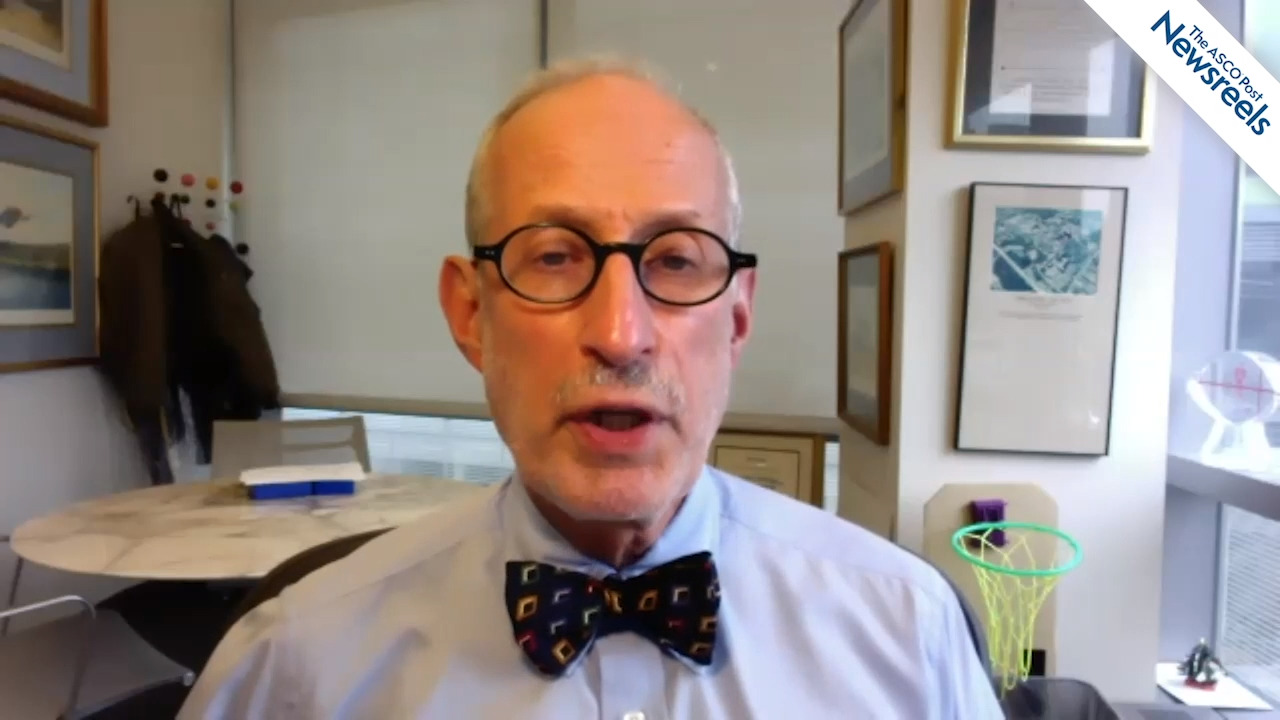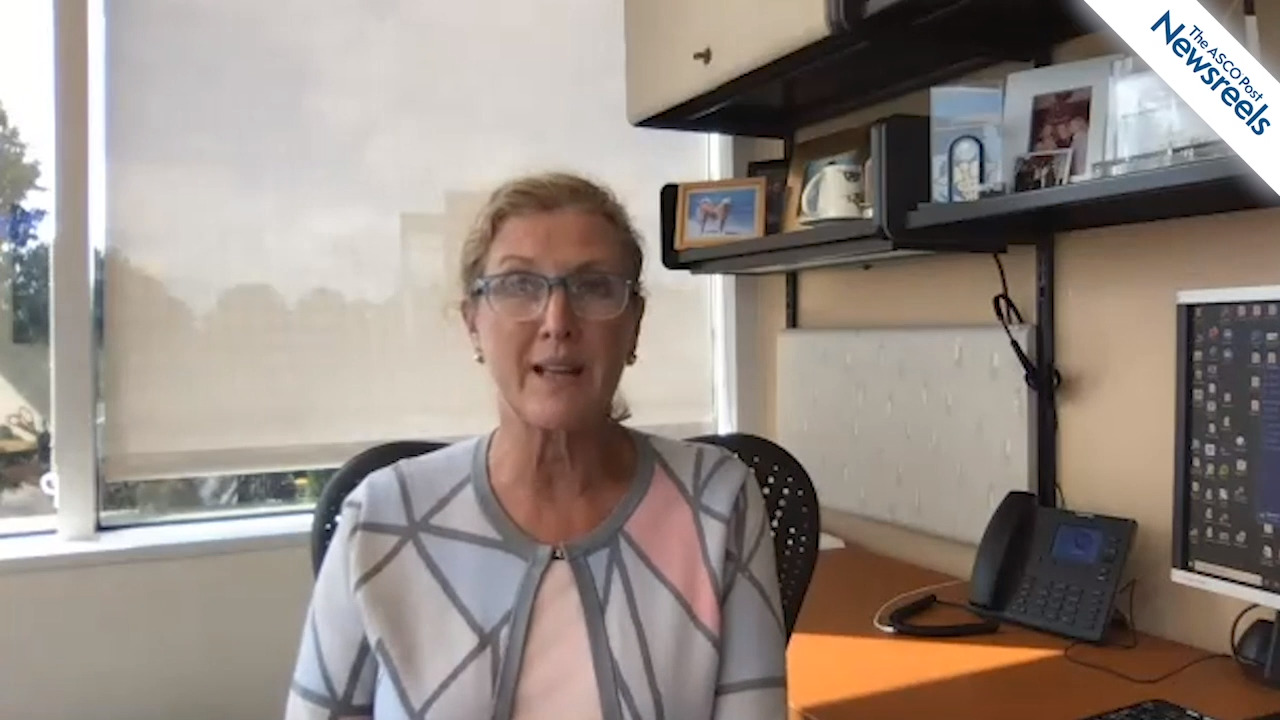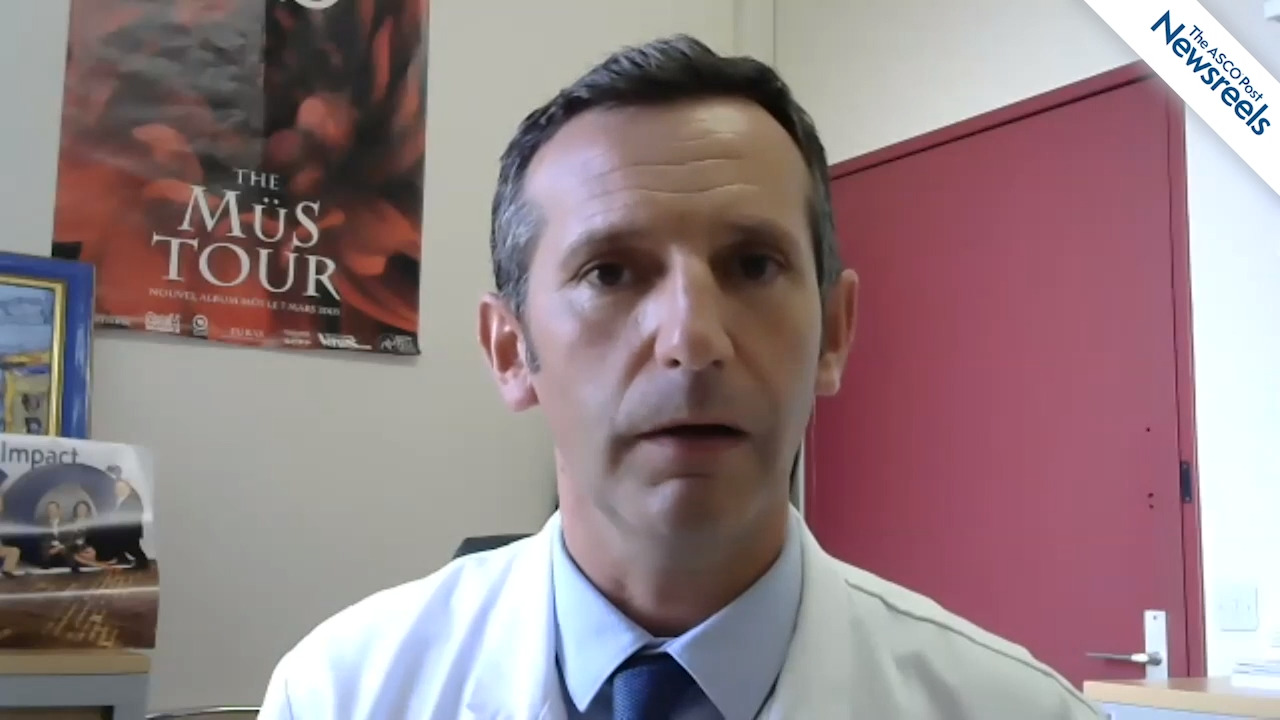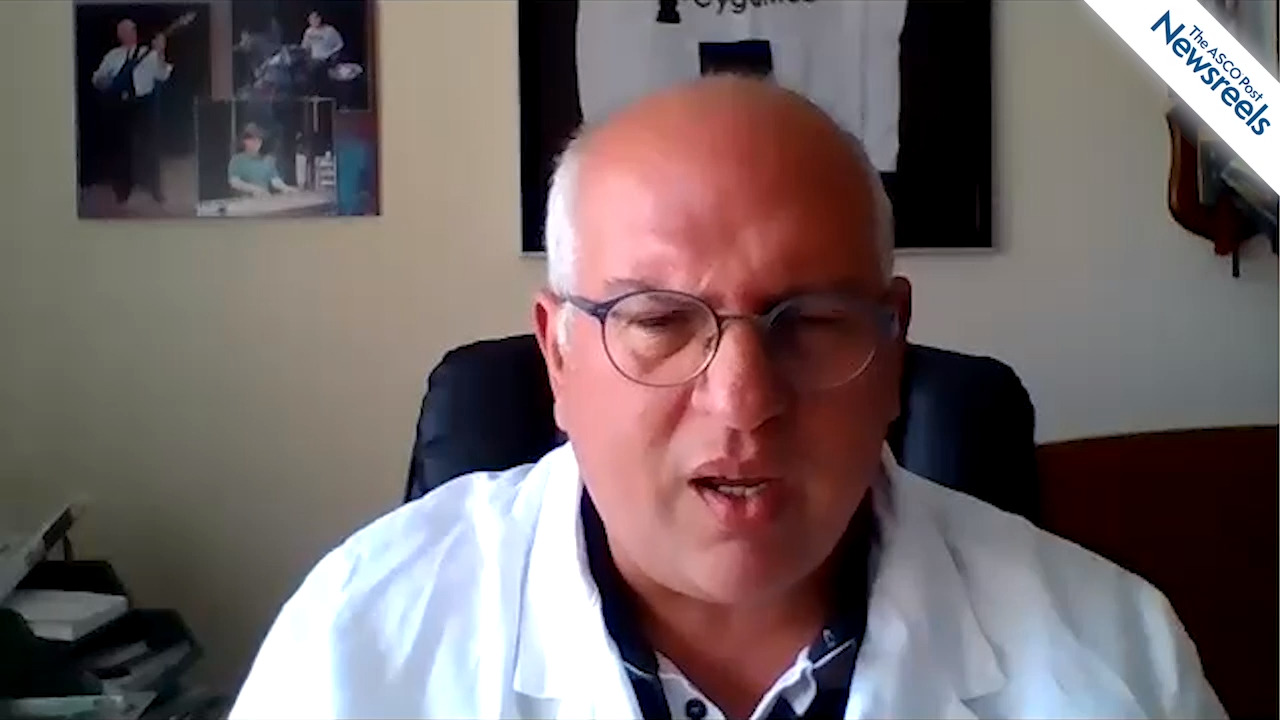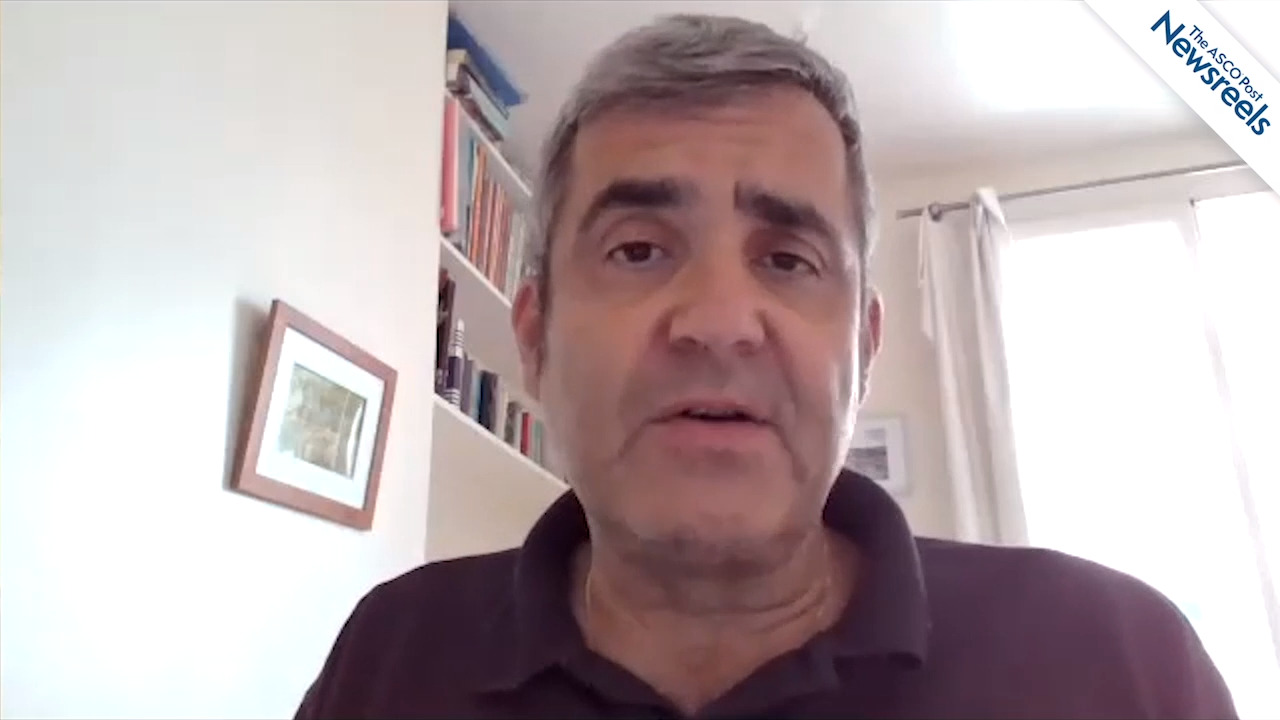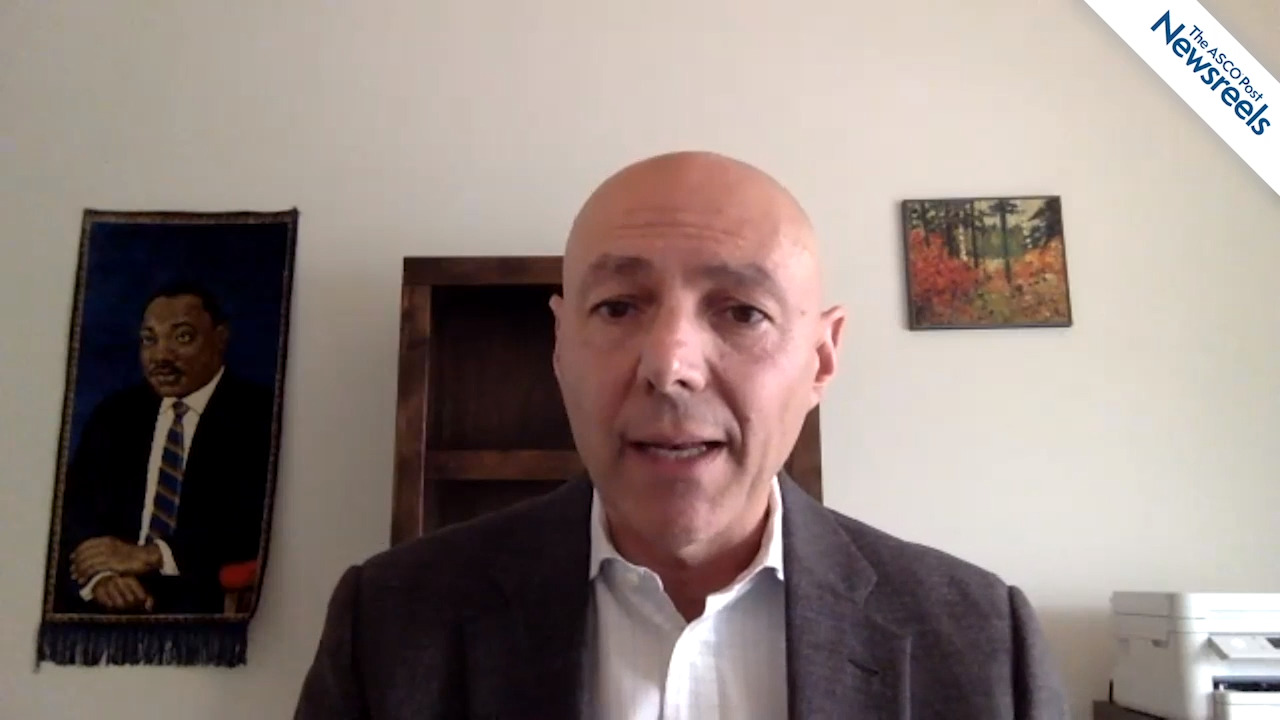Four-Year Findings From the MURANO Trial: Venetoclax Plus Rituximab for Relapsed Chronic Lymphocytic Leukemia
As reported in the Journal of Clinical Oncology by Kater et al, 4-year progression-free and overall survival were significantly greater with venetoclax plus rituximab vs bendamustine plus rituximab in the phase III MURANO trial in patients with relapsed or refractory chronic lymphocytic leukemia....
FDA Approves Nivolumab Plus Ipilimumab for the First-Line Treatment of Unresectable Malignant Pleural Mesothelioma
On October 2, the U.S. Food and Drug Administration (FDA) approved the combination of nivolumab (Opdivo) plus ipilimumab (Yervoy) as first-line treatment for adult patients with unresectable malignant pleural mesothelioma. CheckMate 743 Efficacy was investigated in CheckMate 743, a randomized,...
Jeffrey S. Weber, MD, PhD, on Melanoma: Adjuvant Nivolumab vs Ipilimumab
Jeffrey S. Weber, MD, PhD, of the Perlmutter Cancer Center, NYU Langone, discusses the 4-year recurrence-free and overall survival results from the CheckMate 238 study, which showed adjuvant nivolumab continues to be an effective treatment, vs the comparator ipilimumab, for patients with resected stage III/IV melanoma (Abstract 1076O).
Expert Point of View: Lisa A. Carey, MD
Invited study discussant Lisa A. Carey, MD, the Richardson and Marilyn Jacobs Preyer Distinguished Professor in Breast Cancer Research and Deputy Director of Clinical Sciences at the University of North Carolina-Chapel Hill, framed her remarks as a tale of two trials. Dr. Carey asked these...
IMpassion131: No Benefit for Atezolizumab Plus Paclitaxel in Triple-Negative Breast Cancer
Based on some unexpected negative results, oncologists using atezolizumab for metastatic triple-negative breast cancer should pair it with nab-paclitaxel, not paclitaxel. In contrast to the overall survival benefit shown for atezolizumab plus nab-paclitaxel in the previous IMpassion130...
FDA Pipeline: Priority Review for Agents in Multiple Myeloma, Anaplastic Large Cell Lymphoma
Recently, the U.S. Food and Drug Administration (FDA) granted Priority Review to therapies for pretreated patients with multiple myeloma and pediatric patients with ALK-positive anaplastic large cell lymphoma; granted Fast Track designation to novel agents in gastric/gastroesophageal junction...
Four-Year Outcomes in CheckMate 238: Adjuvant Nivolumab vs Ipilimumab in Stage IIIB–IIIC or IV Melanoma
As reported in The Lancet Oncology by Paolo A. Ascierto, MD, and colleagues, 4-year results of the CheckMate 238 trial show the continued benefit of adjuvant nivolumab vs ipilimumab in recurrence-free and metastasis-free survival in patients with resected stage IIIB–IIIC or IV melanoma, with no...
First-Line Durvalumab With or Without Tremelimumab vs Chemotherapy for Metastatic Urothelial Carcinoma
In the phase III DANUBE trial, reported in The Lancet Oncology, Thomas Powles, MD, PhD, and colleagues found that durvalumab monotherapy did not prolong overall survival vs standard chemotherapy in previously untreated patients with largely metastatic urothelial carcinoma with high PD-L1...
Addition of Atezolizumab to Neoadjuvant Chemotherapy in Early-Stage Triple-Negative Breast Cancer: IMpassion031 Trial
As reported in The Lancet by Elizabeth A. Mittendorf, MD, and colleagues, results from the phase III IMpassion031 trial showed improved pathologic complete response rates with the addition of atezolizumab to sequential nab-paclitaxel and anthracycline-based neoadjuvant chemotherapy in patients with ...
Lisa A. Carey, MD, on Triple-Negative Breast Cancer: Paclitaxel, Nab-paclitaxel, and Atezolizumab in IMpassion Trials
Lisa A. Carey, MD, of the University of North Carolina, discusses phase III results from two IMpassion trials, 130 and 131, which explored, respectively, atezolizumab plus nab-paclitaxel vs placebo plus nab-paclitaxel in previously untreated locally advanced or metastatic triple-negative breast cancer and first-line paclitaxel with or without atezolizumab for unresectable disease (Abstracts LBA15 and LBA16).
First-in-Class Human IgG4 Monoclonal Antibody Shows Activity Alone and Combined With Pembrolizumab in Advanced Solid Tumors
MK-4830—a novel, first-in-class human IgG4 monoclonal antibody targeting the myeloid-specific anti–immunoglobulin-like transcript 4 (ILT4) receptor—administered either as a single agent or in combination with pembrolizumab was well tolerated and showed activity in heavily pretreated patients with...
Addition of Immunotherapy to Other Treatments in Patients With Brain Metastases After Definitive Surgery
In a National Cancer Database analysis reported in JAMA Network Open, Amin et al found that among patients with brain metastases who underwent definitive surgery for primary tumors, the combination of immunotherapy and radiotherapy prolonged overall survival compared with radiotherapy alone. Study...
Benefit of Pembrolizumab in High-Risk Stage III Melanoma: 3-Year Follow-up
As reported in the Journal of Clinical Oncology by Alexander M.M. Eggermont, MD, PhD, and colleagues, adjuvant pembrolizumab maintained a significant recurrence-free survival benefit vs placebo in patients with high-risk stage III melanoma after a median 3-year follow-up in the phase III EORTC...
Alexander M. Eggermont, MD, PhD, on Melanoma: Pembrolizumab vs Placebo After Complete Resection
Alexander M. Eggermont, MD, PhD, of the Princess Maxima Center for Pediatric Oncology, discusses final results of the phase III EORTC 1325-MG/Keynote 054 trial, which confirmed a sustained recurrence-free survival benefit of pembrolizumab vs placebo in patients with resected high-risk stage III melanoma, as well as a decrease in the incidence of distant and locoregional recurrence (Abstract LBA46).
Aditya Bardia, MD, MPH, on Triple-Negative Breast Cancer: Sacituzumab Govitecan vs Treatment of Physician’s Choice
Aditya Bardia, MD, MPH, of Massachusetts General Hospital Cancer Center, discusses results from the phase III ASCENT trial, which showed the antibody-drug conjugate sacituzumab govitecan-hziy improved progression-free and overall survival more than standard single-agent chemotherapy in patients with previously treated metastatic triple-negative breast cancer (Abstract LBA17).
Does Pembrolizumab Monotherapy Demonstrate Benefit in Rare Sarcomas?
Pembrolizumab monotherapy induced responses in patients with rare sarcomas that varied by histotype, according to findings presented by Jean-Yves Blay, MD, at the ESMO Virtual Congress 2020 (Abstract 1619O). Methods Dr. Blay presented first results from a cohort of patients with rare sarcomas in...
NCCN Adds Tafasitamab-cxix to Its Clinical Practice Guidelines in Oncology for B-Cell Lymphomas
MorphoSys and Incyte have announced that tafasitamab-cxix, a humanized Fc-modified cytolytic CD19-targeting monoclonal antibody, has been included in the latest National Comprehensive Cancer Network Clinical Practice Guidelines® (NCCN Guidelines®) in Oncology for B-Cell Lymphomas. Specifically,...
Brexucabtagene Autoleucel for Relapsed or Refractory Mantle Cell Lymphoma
On July 24, 2020, brexucabtagene autoleucel, a CD19-directed genetically modified autologous T-cell immunotherapy, was granted accelerated approval for the treatment of adult patients with relapsed or refractory mantle cell lymphoma.1,2 Brexucabtagene autoleucel is approved with a Risk Evaluation...
Updates on BCMA-Directed CAR-Modified T-Cell Gene Therapies
Outcomes in patients with triple-class–failure relapsed and refractory multiple myeloma who experience disease progression on immunomodulatory agents, proteasome inhibitors, and CD38 antibodies are dismal. Most recently, early results of three anti-B-cell maturation antigen (BCMA) chimeric antigen...
Phase III NALA Trial Meets Primary Endpoint in Previously Treated HER2-Positive Breast Cancer
As reported in the Journal of Clinical Oncology by Cristina Saura, MD, of Vall d’Hebron University Hospital, Barcelona, and colleagues, the phase III NALA trial has shown significantly prolonged progression-free survival with the irreversible pan-HER tyrosine kinase inhibitor neratinib plus...
Newer Therapeutic Approaches Improving Outcomes in Hodgkin Lymphoma
At the 2020 Debates and Didactics in Hematology and Oncology Virtual Conference, sponsored by Emory University School of Medicine and Winship Cancer Institute, Pamela Allen, MD, Assistant Professor of Medicine at Emory, described recent trials on therapeutic approaches that are informative on this...
Meta-analyses of Quality of Life in Patients Treated With Checkpoint Inhibitors
Findings from two meta-analyses designed to summarize quality-of-life data on patients receiving immune checkpoint inhibitor therapy for cancer were presented at the ESMO Virtual Congress 2020 (Abstract 1568O). These meta-analyses found that patients receiving immune checkpoint inhibitors had...
Nivolumab Shows Activity in edPOLE-Mutated, MMR-Proficient Advanced Cancers
Nivolumab monotherapy showed high response and disease control rates in patients with pathogenic exonuclease domain POLE (edPOLE)-mutated, mismatch repair (MMR)-proficient advanced tumors containing confirmed pathogenic mutations, according to findings presented by Benoit J.C. Rousseau, MD, PhD, of ...
Continuous vs Fixed-Duration Immunotherapy in Previously Treated Patients With Advanced NSCLC
In an exploratory analysis of the phase IIIb/IV CheckMate 153 trial published in the Journal of Clinical Oncology, David M. Waterhouse, MD, MPH, and colleagues found that continuing nivolumab beyond 1 year of treatment vs stopping at 1 year of treatment was associated with better outcomes in...
Adjuvant Nivolumab vs Ipilimumab in Resected Advanced Melanoma: Long-Term Follow-up of CheckMate 238
Long-term findings from the phase III CheckMate 238 study showed that nivolumab improved 4-year recurrence-free survival compared with ipilimumab in patients with resected stage IIIB to C or IV melanoma in the overall population as well as across subgroups of patients stratified by disease stage...
Association of Tumor Mutational Burden With Response to Pembrolizumab in Previously Treated Patients With Advanced Solid Tumors
A prospective biomarker analysis of the multicohort phase II KEYNOTE-158 trial reported by Marabelle et al in The Lancet Oncology found that patients with previously treated advanced solid tumors were more likely to respond to pembrolizumab monotherapy if they had high tissue tumor mutational...
Early-Phase Trial Explores Cabozantinib and Nivolumab With or Without Ipilimumab in Advanced Genitourinary Malignancies
In a phase I trial reported in the Journal of Clinical Oncology, Andrea B. Apolo, MD, and colleagues found that the combination of cabozantinib and nivolumab, as well as the combination of cabozantinib/nivolumab plus ipilimumab, produced durable responses in patients with metastatic urothelial...
Benjamin Besse, MD, PhD, on NSCLC: Neoadjuvant Atezolizumab for Resectable Disease
Benjamin Besse, MD, PhD, of the Gustave Roussy Cancer Centre, discusses results of the phase II PRINCEPS trial, which assessed, for the first time, the effect of just one injection of the immunotherapy atezolizumab before surgery in patients with resectable non–small cell lung cancer (Abstract 1215O).
Paolo A. Ascierto, MD, on Melanoma: Sequencing Targeted Treatments and Immunotherapy
Paolo A. Ascierto, MD, of the Istituto Nazionale Tumori, discusses phase II results on progression-free survival for patients with advanced melanoma in the SECOMBIT study, whose aim is to evaluate the different sequencing of a BRAF inhibitor (encorafenib) plus a MEK inhibitor (binimetinib) with ipilimumab plus nivolumab (Abstract LBA45).
Thierry Andre, MD, on Colorectal Cancer: Health-Related Quality of Life With Pembrolizumab vs Chemotherapy
Thierry Andre, MD, of Hôpital Saint-Antoine, discusses phase III KEYNOTE-177 findings on the reduced risk of disease progression or death in patients receiving pembrolizumab monotherapy as a first-line treatment of microsatellite instability–high and/or mismatch repair–deficient metastatic colorectal cancer (Abstract 396O).
Sumanta K. Pal, MD, on Renal Cell Carcinoma: Cabozantinib Plus Atezolizumab as First-Line Therapy
Sumanta K. Pal, MD, of the City of Hope National Medical Center, discusses results from the COSMIC-021 study, which tested two different doses of cabozantinib, each with a standard dose of atezolizumab, administered to patients with metastatic advanced clear cell renal cell carcinoma. Dr. Pal reports on response rates and progression-free survival, as well as biologic correlates that may have influenced response (Abstract 702O).
First-Line Checkpoint Inhibitors May Improve Survival in Gastroesophageal Cancers
Immune therapy for advanced gastroesophageal cancer has taken a leap forward by showing its value in the first-line setting, according to two studies in which nivolumab and pembrolizumab, both given with chemotherapy, significantly improved overall survival vs chemotherapy alone. The studies,...
Ezra E.W. Cohen, MD, on Head and Neck Cancer: Avelumab and Chemoradiotherapy in Locally Advanced Disease
Ezra E.W. Cohen, MD, of the University of California, San Diego, discusses primary results of the phase III JAVELIN trial of locally advanced squamous cell carcinoma of the head and neck, in which the immune checkpoint inhibitor avelumab was combined with chemoradiotherapy followed by avelumab maintenance. Although the study results were negative, Dr. Cohen suggests other regimens that may prove to be effective (Abstract 910O).
Toni K. Choueiri, MD, on RCC: Nivolumab Plus Cabozantinib vs Sunitinib in First-Line Treatment
Toni K. Choueiri, MD, of Dana-Farber Cancer Institute, discusses the first results from the phase III CheckMate 9ER trial, which suggested the combination of nivolumab and cabozantinib is safe. It showed activity in progression-free and overall survival, as well as in overall response rates and may have a place in treating patients with metastatic renal cell carcinoma (Abstract 696O_PR).
CheckMate 9ER Trial Shows Benefit of Novel Doublet for Advanced Kidney Cancer
The combination of nivolumab plus cabozantinib was superior to the former standard, sunitinib, as first-line treatment for advanced/metastatic renal cell carcinoma, according to results of the phase III CheckMate 9ER trial reported by Toni K. Choueiri, MD, and colleagues at the ESMO Virtual...
Maintenance Avelumab Plus Best Supportive Care in Advanced Bladder Cancer
Findings from the JAVELIN Bladder 100 trial were published by Thomas Powles, MD, and colleagues in The New England Journal of Medicine. Researchers reported that the PD-L1 inhibitor avelumab led to a 31% reduction in risk of death, and extended median survival by more than 7 months in patients with ...
Addition of Pembrolizumab to Eribulin in HR-Positive, HER2-Negative Metastatic Breast Cancer
In a phase II trial reported in JAMA Oncology, Sara M. Tolaney, MD, MPH, and colleagues found that the addition of pembrolizumab to eribulin did not improve progression-free survival in women with hormone receptor (HR)-positive, HER2-negative metastatic breast cancer. As stated by the...
First-Line PD-1 Inhibitor With or Without Chemotherapy vs Chemotherapy Alone in Advanced Gastric Cancer: KEYNOTE-062
As reported in JAMA Oncology by Kohei Shitara, MD, and colleagues, the phase III KEYNOTE-062 trial showed no significant improvement in overall or progression-free survival with first-line pembrolizumab with or without chemotherapy vs chemotherapy alone in patients with PD-L1–positive advanced...
Proton Pump Inhibitor Use May Be Associated With Worse Outcomes in Patients Treated With Atezolizumab for Urothelial Cancer
Recent evidence indicates that proton pump inhibitors may cause significant changes in the gut microbiota; gut microbiota dysbiosis has been linked to reduced immune checkpoint inhibitor effectiveness. In a retrospective analysis of clinical trials investigating the immune checkpoint inhibitor...
Meta-analysis of Duration of Adjuvant Trastuzumab in Early Breast Cancer
In individual participant data and trial-level meta-analyses reported in JAMA Network Open, Gulia et al found that disease-free survival with adjuvant trastuzumab given for less than 1 year was noninferior to 1 year of trastuzumab therapy in patients with early breast cancer. In addition, the...
Dr. Kantarjian Shares His Thoughts on Optimizing the Treatment of Adults With ALL
In the treatment of adults with acute lymphoblastic leukemia (ALL), use of newer antibodies and de-intensification of chemotherapy have greatly improved outcomes, according to Hagop Kantarjian, MD, who has been very involved in much of the research in ALL treatment. Dr. Kantarjian, Professor and...
Combination Immunotherapy Benefits Subset of Patients With Advanced Prostate Cancer
Results from a phase II trial led by researchers at The University of Texas MD Anderson Cancer Center suggest that a combination of ipilimumab (anti–CTLA-4) plus nivolumab (anti–PD-1) can generate durable responses in a subset of patients with metastatic castration-resistant prostate cancer, an...
Immune Checkpoint Inhibitor Therapy May Contribute to Arterial Inflammation
According to findings from a small study published by Calabretta et al in Circulation, treatment with immune checkpoint inhibitors may worsen inflammation in the arteries that distribute blood from the heart. The research found increased inflammation in the large arteries of 20 Austrian patients...
First-Line Durvalumab Plus Cisplatin/Pemetrexed in Malignant Pleural Mesothelioma
As reported in The Lancet Oncology by Nowak et al, the Australian phase II DREAM trial showed activity with the triplet of durvalumab plus cisplatin/pemetrexed in previously untreated patients with advanced malignant mesothelioma. Study Details In the multicenter trial, 54 evaluable patients with...
Lisocabtagene Maraleucel for Relapsed or Refractory Large B-Cell Lymphomas
In the TRANSCEND NHL 001 study reported in The Lancet, Jeremy S. Abramson, MD, and colleagues found that the autologous CD19-directed chimeric antigen receptor (CAR) T-cell agent lisocabtagene maraleucel (liso-cel) produced a high response rate in patients with relapsed or refractory large B-cell...
Atezolizumab Plus Cobimetinib/Vemurafenib in BRAF V600–Positive Unresectable or Metastatic Melanoma
On July 30, 2020, atezolizumab was granted approval for use in combination with cobimetinib and vemurafenib for patients with BRAF V600 mutation–positive unresectable or metastatic melanoma.1,2 Supporting Efficacy Data Approval was based on findings from the phase III, double-blind IMspire150 trial ...
Avelumab in Maintenance Treatment of Urothelial Carcinoma
On June 30, 2020, avelumab was approved for maintenance treatment of patients with locally advanced or metastatic urothelial carcinoma that has not progressed with first-line platinum-containing chemotherapy.1,2 Supporting Efficacy Data Approval was based on findings in the randomized, multicenter, ...
Update on Novel Immunotherapies for Plasma Cell Disorders
In this installment of The ASCO Post’s Hematology Expert Review, we take a closer look at the monoclonal antibody targeting CD38, daratumumab, in the treatment of amyloid light chain (AL) amyloidosis and resistant multiple myeloma as well as the antibody-drug conjugate belantamab mafodotin-blmf,...
Growing Body of Evidence Supports Adjuvant Immunotherapy for Stage IV Melanoma With No Evidence of Disease
With incredibly paced approvals and clinical advancements in the systemic therapy of cutaneous melanoma, the efficacy of immunotherapy in this disease is clear. However, many important questions remain regarding timing and dosing—in other words, which drug (or drugs) makes the most sense and in...
Expert Point of View: Dean A. Fennell, FRCP, PhD
Invited discussant of the CheckMate 743 trial, Dean A. Fennell, FRCP, PhD, Director of the Mesothelioma Research Program and Chair of Thoracic Oncology at The University of Leicester and University Hospitals of Leicester, United Kingdom, noted the combination of nivolumab and ipilimumab has been...
